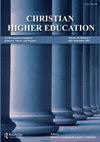Faith, Scholarship, and Service-Learning in Music Education: A Creative Approach
IF 0.5
Q4 EDUCATION & EDUCATIONAL RESEARCH
引用次数: 0
Abstract
Abstract This study addressed how faith integration (FI), service-learning (SL), and academic learning can be combined for deeper engagement in an undergraduate music education instrument techniques class. Often instrument techniques classes are seen as consisting of learning the basics of an instrument (facts, knowledge, and basic skills), but not necessarily reaching higher levels of learning that include applying, analyzing, evaluating, and creating. Additionally, techniques classes, like other skills-based academic offerings, may be viewed as having no direct connections to FI, given that the focus is on learning the technique of playing an instrument. In this research project, university music education students (preservice music teachers) were challenged to grow in their understanding of how creativity and SL could be combined to increase their own skills for playing an instrument and for teaching that instrument to others. Throughout the project, the university students were also challenged to connect creativity, academic learning, and SL with their core beliefs and understanding of their faith. Assessment data collected at the conclusion of the course indicated that the majority of the students’ academic knowledge, beliefs, disposition, character, and desire for action had been beneficially impacted during the course through the SL experience. The majority of students reported having found joy in composing their own music as well as in facilitating beginning band students in learning composition skills. At the same time, the students self-reported having gained valuable skills and knowledge required for all music teachers.音乐教育中的信仰、学识与服务学习:一种创造性的方法
摘要本研究探讨如何将信仰整合(FI)、服务学习(SL)和学术学习结合起来,在本科音乐教育乐器技术课程中进行更深入的参与。通常,乐器技术课程被视为由学习乐器的基础知识(事实、知识和基本技能)组成,但不一定达到更高层次的学习,包括应用、分析、评估和创造。此外,技术课程,像其他以技能为基础的学术课程一样,可能被视为与FI没有直接联系,因为重点是学习演奏乐器的技术。在这个研究项目中,大学音乐教育的学生(职前音乐教师)面临的挑战是,他们对如何将创造力和语言学习结合起来,提高自己演奏乐器和向他人教授乐器的技能的理解有所增长。在整个项目中,大学生们还面临着将创造力、学术学习和SL与他们的核心信仰和对信仰的理解联系起来的挑战。课程结束时收集的评估数据表明,大多数学生的学术知识、信仰、性格、性格和行动愿望在课程期间通过SL体验得到了有益的影响。大多数学生报告说,他们在创作自己的音乐以及帮助乐队初学者学习作曲技巧方面找到了乐趣。与此同时,学生们自我报告说,他们获得了所有音乐教师所需的宝贵技能和知识。
本文章由计算机程序翻译,如有差异,请以英文原文为准。
求助全文
约1分钟内获得全文
求助全文

 求助内容:
求助内容: 应助结果提醒方式:
应助结果提醒方式:


